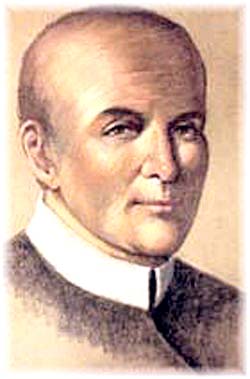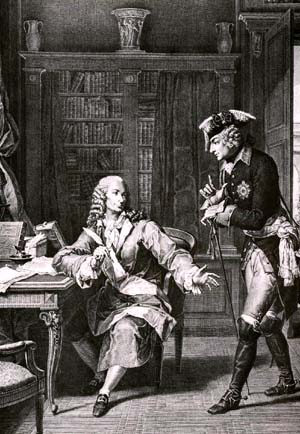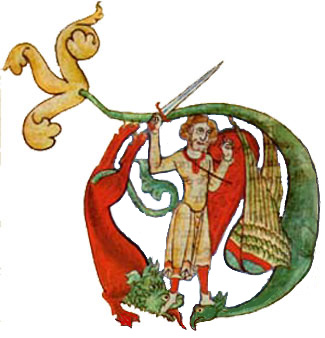 |
The Saint of the Day
St. Clement Marie Hofbauer, March 15
Prof. Plinio Corrêa de Oliveira
Biographical selection:
Apostle of Vienna, born in Tasswitz, Austria on December 26, 1751, died on March 15, 1821.
After his course in theology, Clement entered the University of Vienna for seminary training. It was not long before he realized that some of his teachers were not rejecting the Rationalism of the 18th century. They were looking for a strange reconciliation between Catholic doctrine and Enlightenment thinking.

St. Clement Marie Hofbauer, intransigent in his defense of the Catholic Faith
|
From the time he was very young, Clement had been gifted with a secure Catholic sense that permitted him to distinguish with certainty what was true Catholic doctrine. He was anguished, therefore, to hear these falsified doctrines.
One day after class, he went to the teacher to present objections to the adaptation to Enlightenment thinking that the professor had made in his lecture. The teacher tried to explain to him that it would be very difficult in the climate of the epoch to follow the traditional doctrine of the Church, since only the language of reason was accepted, either from the pulpit or the university chairs. He concluded: “We have to swim with the tide if we don’t want to be left behind.”
The simple son of a laborer responded: “To swim with the tide in this case is cowardice, since we have to fight and swim against the tide of this ocean. Whosoever wants to shine the light upon the road for this century must ignite his torch in the light of Revelation.”
The professor replied: “Hofbauer, you will preach to empty pews. Our epoch no longer supports that kind of talk.”
Clement made this reply: “If what you say is true, then we are already in the end times announced by St. Paul, who said that times would come that would no longer tolerate sound doctrine. What would St. Paul say about your thinking, professor?”
On another occasion a professor stated in class that the Immaculate Conception of the Holy Virgin was just a pious legend, and that it should no longer be spoken of in public. Clement stood up indignantly and said: “Professor, this doctrine is not Catholic!” And he left the room.
“Perhaps one day a little more light will enter the mind of this peasant!” the professor shouted to his retreating back. But he was obliged to end the class then, since the room had emptied. All the students had followed Hofbauer.
Comments of Prof. Plinio:
It is interesting to note and identify here the methods of the Revolution. The 18th century seems very remote to us. It was the time of litters, hoop skirts and tricorne hats. The 19th century also seems far away to us today. Perhaps some of you would not distinguish the century of Ramses II from the century of Queen Victoria. Almost everything from the past seems immersed in the same cloudy historical background.

The Englightenment was represented by Voltaire, left, and his "disciple" King Frederick II of Prussia, right
|
Well, in that time that seems so ancient to us, men already imagined themselves to be very modern. They already defended the idea that one has to cede a little in face of the Revolution in order not to give up everything. This motto was already being adopted: “Cede to not lose.” The same modernist current that we see today was already using the same methods and assuming the same type of cowardice.
Notice, for example, the threat the professor made to St. Clement Marie Hofbauer: “When you leave here, you will preach to empty pews.” It is the same thing they say to us: The doctrine you defend is no longer able to attract men today.
But in reality what happened was that St. Clement spoke out, and the whole class followed him. Therefore, the situation was not so lost as they presented it. It is a fact that the Enlightenment exerted great influence on the leadership and some among the grassroots. But there were still persons who were disposed to follow one who would courageously act and take up the complete Catholic position. Yesterday – as well as today – the right thing to do is to speak the whole truth.
It is also interesting to see how counter-revolutionary the position of St. Clement Marie Hofbauer was. He fought against the motto: “Cede to not lose.” He did not cede an inch in face of the threat that he would be preaching to empty pews. If this, in fact, would happen, his conclusion was that the end times had arrived. His professor didn’t want to think about such a thing. Like almost all the progressivists today, the liberals of that time didn’t want to consider that possibility – for them there is no end of time. On the contrary, what they want is more time to enjoy life. The same spirit that opposed St. Clement Hofbauer in the 18th and 19th centuries is combating us today.
In the similarities you find in this episode from the life of St. Clement Hofbauer and in what happens in our fight today, you can see one of the principle laws of History. That is, that there is a continuity in the same good spirit and the same bad spirit fighting one another through the centuries.

Counter-revolutionaries are united in a historic chain under the protection of Our Lady
|
For this reason we should not consider ourselves as a small group that is separated from everyone in the past and the future, like something that suddenly appeared out of nowhere separated from everything, like a cork floating on the ocean. No, we are not alone, we are those who are united with a whole current of Catholics, those who continue and maintain a state of spirit that has existed since the beginning of History and will last until the end. We are a link in the most magnificent and majestic of chains, the chain of the slaves of Our Lady who will crush the head of the serpent.
From the example of St. Clement Marie Hofbauer, we can see that the enemies he combated are the same as the enemies we combat. Our fight did not start today. It is a fight that began long ago and will last much longer. It is part of a golden chain that started in the Old Testament and will continue until the final days of tribulation when the last Catholics will still be fighting even if they consider everything to be lost.
At that moment the Son of Man, Our Lord Jesus Christ, will come in great pomp and majesty to conquer, to judge and to close History. And then, this chain will be complete and all of its member will join together, by the favor of Our Lady, in Heaven.


  | | Prof. Plinio Corrêa de Oliveira | |
The Saint of the Day features highlights from the lives of saints based on comments made by the late Prof. Plinio Corrêa de Oliveira. Following the example of St. John Bosco who used to make similar talks for the boys of his College, each evening it was Prof. Plinio’s custom to make a short commentary on the lives of the next day’s saint in a meeting for youth in order to encourage them in the practice of virtue and love for the Catholic Church. TIA thought that its readers could profit from these valuable commentaries.
The texts of both the biographical data and the comments come from personal notes taken by Atila S. Guimarães from 1964 to 1995. Given the fact that the source is a personal notebook, it is possible that at times the biographic notes transcribed here will not rigorously follow the original text read by Prof. Plinio. The commentaries have also been adapted and translated for TIA’s site.
|
Saint of the Day | Home | Books | CDs | Search | Contact Us | Donate

© 2002- Tradition in Action, Inc. All Rights Reserved
|
 |
|